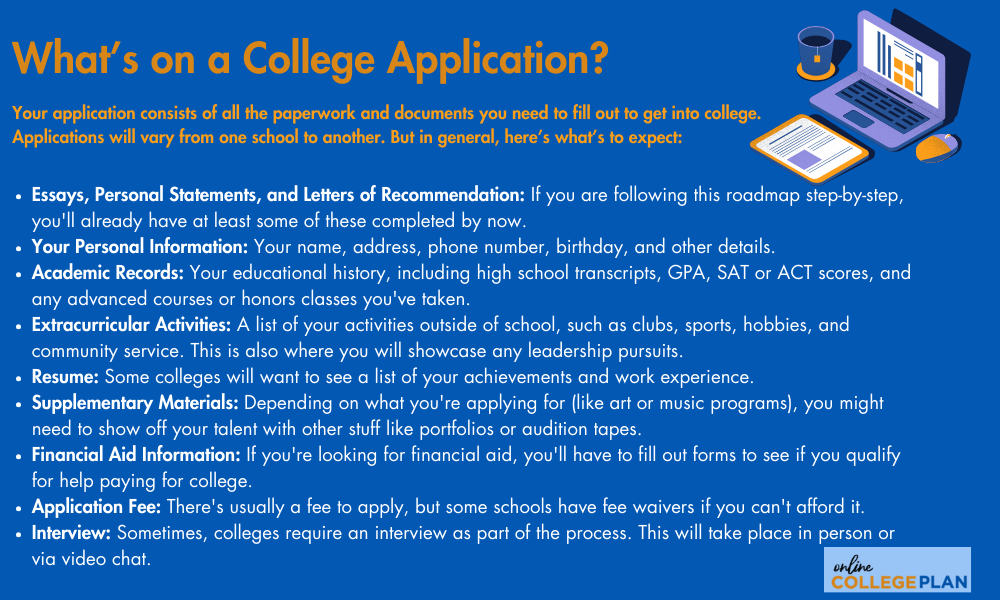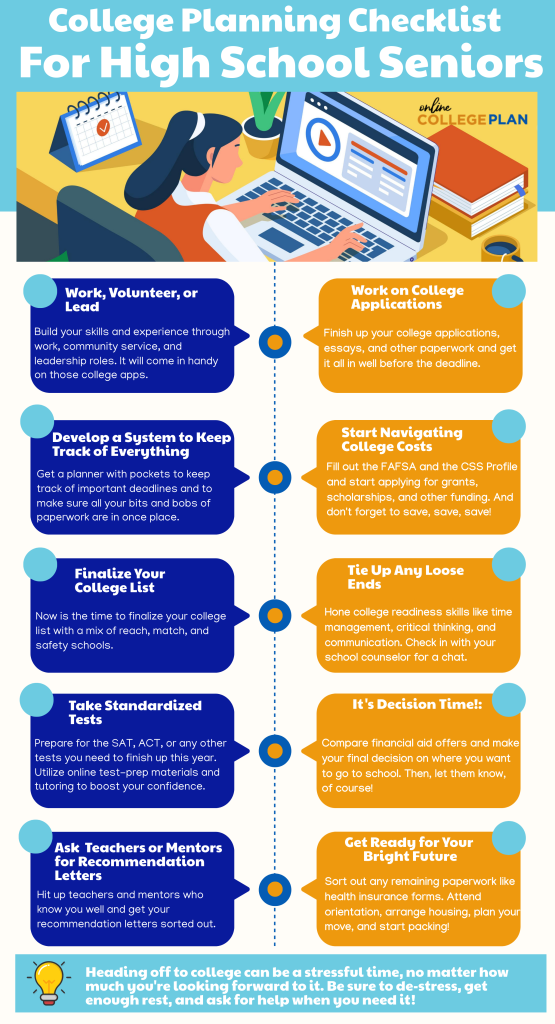Senior Year College Prep: An Easy Guide to Success
Find your degree

It’s senior year, and the countdown to your future has officially begun. Preparing for college in your senior year of high school is like navigating a new city without a map; exciting but overwhelming.
You’re about to embark on one of life’s greatest adventures. Think college applications, scholarship hunts, and financial aid forms—oh my! Don’t worry though; with an early start and some savvy planning, you’ll be set up for success. In this post, we’ll guide you through the whirlwind of milestones and deadlines so you can break things down into manageable chunks.
Related Resources:
- College Tours: An Easy Guide for Parents
- Evaluating Campus Facilities: An Easy Guide for All Students
- An Easy Campus Visit Checklist for Prospective Students
The Summer Before Senior Year:
Work, Volunteer, or Lead
This is the last chance you’ll have to build up skills and experiences that will come in handy when filling out those applications. So, it’s a good idea to make the most of it through work, community service, or leadership roles.
Gain Some Work Experience
If you want to ramp up your extracurricular game, getting some real-world work experience is a solid move. Whether it’s a part-time gig or a summer internship, it’s a chance to pick up some skills, explore potential career paths, and build a professional network for the future. Saving money should also be on your radar because higher education doesn’t come cheap. Stash away your earnings or find ways to cut back on spending (do you really need another pair of sneakers?) Besides, every penny counts toward textbooks and dorm decor.
Participate in Community Service
Jumping into community service is another cool way to get involved. Whether it’s volunteering at a local organization or joining a service trip, it’s a chance to grow your empathy, compassion, and sense of responsibility to your community. Plus, it’s a way to check out potential career paths and get some awesome experience.
Take on Leadership Roles
Look for opportunities to step into leadership roles in clubs or organizations you’re already involved in. Colleges dig students who take on leadership roles because it shows you’re on the ball, reliable, and can take the lead. Plus, it gives them a peek into how you can bring something extra to campus life. Basically, colleges want a mix of students who bring different strengths to the table, and having leadership experience is a big plus.
Get Organized
You’ve got a busy year coming up, and even the most organized seniors feel like they’re caught in a tornado once school starts. So now is the time to get yourself organized so you can stay on top of it all—before the storm arrives. Think of it as setting up dominoes; get them lined up right now, and you’ll thank yourself later when things start falling neatly into place.
Set up a System to Keep Track of Application Stuff
To stay organized while applying to college, it’s key to keep tabs on all the necessary bits and pieces. This means transcripts, test scores, letters of recommendation, essays, and those application fees. One way to do this is to whip up a spreadsheet or table with all the stuff you need and when it’s due. This way, you can make sure everything gets sent in on time and nothing slips through the cracks.
Invest in a Planner
Another big part of staying organized is keeping a handle on all the important dates. You can do this with an app, but we recommend a good old-fashioned planner. Make sure to jot down all the key dates like application deadlines, test dates, and college visits. This way, you can plan ahead and dodge any last-minute freak-outs. It’s also a good idea to set reminders on your phone to make sure nothing slips your mind.
August-September
Finalize Your College List
Finding the right college is like assembling a complex puzzle where each piece represents your future. Nearly half of all high school seniors have already started to put this puzzle together by researching and visiting potential colleges. If you’re not quite there yet, you’ve got some work to do.
Make a List of Reach, Match, and Safety Schools
By now, you probably have a good idea of the schools you’d like to apply to. And it’s time to finalize that list so you can move on to other tasks. Making a list of reach, match, and safety schools is a tried-and-true way to help you navigate the process.
- Reach Schools: Your reach schools are the dream big ones – they’re kind of a long shot. These places are super competitive, and your grades might not be up to snuff. But hey, you never know until you try.
- Match Schools: Your match schools? They’re like your old reliable pair of sneakers – they fit just right. You’ve got the grades and scores that jive with what they usually look for, so these colleges could really work out well for you.
- Safety Schools: Finally, you have your safety schools – consider them your comfy backup plan. You’re bringing more to the table than their usual crowd, which means getting in should be a piece of cake. So why not throw ’em into the mix?
Utilize Online Resources
Digital platforms have revolutionized how we explore higher education options. For those who haven’t stepped foot on a campus yet, virtual tours offer an interactive peek into college life without leaving home.From small liberal arts colleges tucked away in cozy towns to sprawling universities at the heart of bustling cities, every type of institution can be found with just a few clicks.
Beyond visual explorations, make sure you dig deep into academic programs related to your desired field; visit school websites directly for specifics about class size, faculty credentials, and available resources that will support your academic success.
Evaluate Campus Culture Through Social Media
Social media channels reveal the day-to-day vibe on campuses better than most official sources ever could—you’ll see what students celebrate (and complain about), get wind of trending clubs or activities…basically sniff out whether you’d enjoy being part of this community long before orientation day rolls around.
Register for and Take Any Necessary Standardized Tests, Such as the SAT or ACT
Come fall, leaves aren’t the only thing dropping—the deadline for standardized tests will sneak up faster than Halloween candy disappears. If SATs or ACTs are still on your to-do list, make sure you’re registered for test dates pronto.
To prepare for standardized tests, you can take practice tests, sign up for test prep courses, and get a tutor if you need one. It’s important to start prepping early and be ready to take the tests more than once if you need to hit your target score.
You might like: SAT and ACT Prep Guide
Ask Your Favorite Teachers or Mentors for Recommendation Letters
When you’re asking for those recommendation letters, it’s best to hit up the teachers who really know you and can talk about how awesome you are. Think about the ones from your favorite classes or the clubs you’re involved in. Before you ask, it’s a good idea to chat with them about your college plans and give them some info about your achievements. Also, make sure you give them plenty of time to write the letter and be cool about it—they’re doing you a solid, after all!
October-November:
Work on Your College Application Essays and Personal Statements
Lots of colleges want essays and personal statements when you apply. It is important to showcase why you feel you’re a good fit for the college and what unique qualities you can bring to the campus community. So get those ideas flowing early and make sure you’ve got enough time to write and tweak everything so it’s ready to go. Here are some tips that might come in handy:
- Be real: Just be yourself and share your own experiences, thoughts, and dreams. Admissions folks want to get to know the real you, not just your grades and scores.
- Show, don’t just tell: Use stories, examples, and details to bring your essay to life and make it more interesting.
- Stay on track: Focus on a specific part of your life or a particular experience that really shows who you are. Don’t try to cover too much in one essay.
- Edit and revise: Take the time to go over your essay and make it better. Look for ways to improve your writing and make your message clearer.
- Get some feedback: Share your essay with people you trust and see what they think. Their advice can help you make your essay even better and make sure it really tells your story.
Tip: Before sending off any materials, double-check the requirements one last time; typos are pesky little buggers that love hiding out in essays till 11:59 PM submission night.
Start Sending in Your College Applications
It’s time to start sending in those college applications, especially if you’re aiming for early decision or early action programs. A strong application paints a clear picture of who you are and what you can bring to the college community.

Once you’ve gathered all this stuff and sent it in, the college admissions committee reviews everything and decides if you get in. It can be pretty competitive, so you’ll want to work hard on your applications to ensure they stand out.
December-January:
Start Navigating College Costs
Getting ready for college can be a super exciting time for high school seniors, but let’s be real, it can also be a bit of a stress-fest when it comes to money. Tuition and living costs keep going up, so it’s key to start planning ahead. Here are some tips to help you out with your senior year financial game plan.
Submit the Free Application for Federal Student Aid (FAFSA) and the CSS Profile
Free Application for Federal Student Aid (FAFSA):
If you started preparing for college in your junior year, it’s likely you’ve already filled out the FAFSA. But if not, it’s vital to get cracking. It’s all online and pretty self-explanatory. Consider it the gateway to a range of financial assistance, including grants, loans, and work-study funds provided by the federal government. Grants are non-repayable, while loans necessitate repayment with interest. Work-study programs afford students the opportunity to work part-time on campus to earn funds for college expenses.
CSS Profile by College Board
Next up is the CSS Profile by College Board. This, too, is entirely online. It’s like your audition tape for colleges, showing them what kind of financial support could help you shine on campus. Not every school asks for it, but those that do might be ready to hand out scholarships or grants based on what they see. So don’t be shy—get that CSS Profile submitted.
If you need a hand with these forms, you can reach out to your high school guidance counselor or the college financial aid office for some help. These folks know their stuff when it comes to financial aid applications. There are also tons of online resources, workshops, and tutorials out there to lend a hand with the FAFSA and CSS Profile.
Explore Scholarships and Grants
Now let’s talk about scoring some cash for college through scholarships and grants. These are usually given out based on your smarts, financial situation, or your special skills and passions. It’s a good idea to dig into as many scholarships and grants as you can to up your chances of getting some help. You’ve got lots of options for finding these opportunities, like online databases, your guidance counselor, and the college financial aid office. Just make sure to read all the rules and get everything in by the deadline.
Don’t Forget About Local Scholarships: Many students don’t realize there are even more scholarships to be had in some unlikely places. Don’t let local scholarships fly under your savvy radar since they can offer additional opportunities and resources that might not be available on a larger scale. Businesses, community organizations, and even schools in your area often sponsor these awards; they tend to have less competition too. So don’t miss out—dig into what your own backyard has to offer when it comes to funding your education.
February-March:
Tie Up Loose Ends
In February and March, it’s all about getting everything sorted as you gear up for college. This is an exciting time, so keep an eye on the mailbox for those acceptance letters and financial aid packages. Plus, it’s a great time to visit the colleges where you’ve been accepted. Getting a feel for the campus and checking out the vibe can really help you finalize the big decision about where you want to spend the next few years.
Hone Some Key College Skills
As a high school senior, it’s a good idea to start honing some Important skills that’ll set you up for success in college and beyond. Here are a few to focus on over the next couple of months:
- Time Management: College classes will be more demanding, so nailing down time management is key. Make a schedule that covers study time, classes, and any extracurricular stuff. Prioritize your tasks and try to steer clear of putting things off.
- Critical Thinking: Being able to analyze info and make decisions based on evidence is a big deal in college. Practice asking questions, weighing evidence, and considering different points of view to sharpen those critical thinking skills.
- Effective Communication: Having top-notch writing and speaking skills, plus the ability to listen and work well with others, is crucial for college and beyond. Practice communicating clearly and respectfully in all sorts of situations, whether it’s in class, group projects, or professional settings.
Maximize Your High School Counselor Resources
Your guidance counselor isn’t just there to nod and smile; they’re your go-to person for mapping out your future. Surprisingly, only a small percentage of seniors take advantage of this gold mine by discussing college prep with their counselors. It’s time to change that.
To ensure you don’t miss out, pencil in a few meetings as if they were hot dates…with destiny. It’s all about setting goals and getting personalized advice that aligns with your ideals. Face-time is crucial because those chats are where dreams get wings – or at least a solid plan.
Your guidance counselor is like that trusty GPS when you’re on a road trip — essential for finding the best route. Those scheduled meet-ups can give you an edge as you transition from high school to college life.
April-May:
Time to Be Decisive
Spring has sprung, and you’re on the home stretch. Give yourself a pat on the back, because you’ve put in a lot of work. At this point, you’re probably up to your elbows in activities like preparing for graduation, prom, senior trips, and other end-of-year celebrations. But there are still some remaining tasks to take care of this month. Its final decision time, folks.
Compare Financial Aid Offers and Select Which College to Attend
For many students, one of the hardest choices of the year is deciding which college to attend. But one way to make it easier is to start comparing your financial aid offers. Here’s how:
Get All Those Letters Together
First, gather up all the financial aid letters you got from the colleges you’re thinking about. They’ll have info about scholarships, grants, work-study, and loans.
Crunch Some Numbers
Do some math to figure out the real cost for each college. Subtract the free money (grants and scholarships) from the total cost (tuition, fees, living expenses). This tells you how much you’ll actually have to pay.
Watch Out for Loans
Pay attention to the loans that are on offer. Check out the interest rates, when you have to start paying, and whether the government’s paying the interest while you’re in school. Try to keep those loans as low as possible.
Think About Your Wallet
Look at your family’s financial situation and see how much they can chip in. Also, think about your future job prospects and whether you’re okay with the potential debt.
Hunt for Extra Cash
Keep your eyes open for outside scholarships or grants. Every bit helps, right?
Work-Study Reality Check
If you’re getting work-study, make sure it will align with your class schedule and life. If so, it can be a nice way to make some cash while you study.
Size Up the Schools
Don’t forget about the non-money stuff! Think about what each college offers academically, where it’s located, and what the vibe is like on campus.
- Visit or Tune In Online: If you haven’t already, visit the colleges you’re super interested in. Or join their online events to get a feel for the place.
- Chat with Current Students: Reach out to current students or grads from those colleges. They can spill the beans on what it’s really like there.
- Think About Appeals: If you’re set on a college but need more financial help, don’t be shy to ask the financial aid office if they can do better. Sometimes they can!
- Make a List, Check It Twice: Put together a list of good stuff and not-so-good stuff for each college. Get it all down on paper, so you can compare and see what feels right.
Remember, it’s about the whole package – the education, cost, campus vibe, and how you see yourself fitting in. Take your time, trust your gut, and go with the college that feels like the best choice for you.
Make the Call
Finally, make your choice! You can give your chosen school the thumbs-up by following the steps in your acceptance letter or admission portal. Usually, this means filling out a formal acceptance form or confirming your enrollment online. You might also need to cough up an enrollment deposit by a certain deadline to lock in your spot. Just make sure to read the school’s instructions carefully and tick all the boxes to officially say “yes” to their offer.
June-July
Prepare for the Transition to College Life
You’ve graduated from high school at last, and you’re finally getting ready to transition to college. It’s gonna be a great summer! For most grads, this is the most exciting time of all. But for some, making the leap can be overwhelming. However, you can make the adjustment smoother with the right mindset and preparation. To get ready for college life, you’ll need to do a few more things.
Get Any Remaining Paperwork Sorted for Your Chosen College
Financial Aid: Get any last bits of financial aid paperwork sorted out so your funding is in place for the upcoming semester.
Health and Wellness: Take care of any medical forms, vaccinations, and health insurance information. This is also a good time to scope out what health services are available at your college.
Course Registration: Sign up for your classes and get the hang of how your college’s course selection and registration process works.
Attend Orientation
Show up for college orientation to get the lowdown on campus life, classes, and what to expect.
Begin Networking
Start reaching out to other students, potential roommates, and new friends through social media or college groups to build your college crew before you even get there.
Arrange Your Housing and Plan Your Move
Sort out where you’re going to live, whether it’s on-campus or off-campus, and take care of any necessary paperwork or deposits. You’ll also want to figure out how you’re getting there, whether you’re shipping stuff, and if you’ve got friends or family helping out with the move.
Start Packing
Don’t forget the basics: Pack your bedding, toiletries, clothes for all seasons, school supplies, and essential documents.
Coordinate with your roommate: If you can, chat with your roommate to avoid bringing double the stuff like mini-fridges and microwaves.
Get organized: Consider getting storage solutions like under-bed containers and over-the-door organizers to make the most of your space.
Make it feel like home: Bring along some personal items like photos, posters, or decorations to personalize your new space.
Dress for the weather: Depending on where you’re headed, make sure to pack for the climate, including winter gear, rain gear, or anything else you might need.
Prepare Yourself Emotionally: Emotional preparation for college might sound a little silly at first. But the truth is, heading off to school can stir up all kinds of feelings. Getting ready for the switch-up in your routine, social scene, and school workload is important. If you’re feeling a bit wobbly, don’t hesitate to chat with your parents, friends, high school guidance counselor, or a mental health pro for some backup. And once you’re on campus, make sure to tap into the counseling services and support groups that are there to help you out.
Frequently Asked Questions
During your senior year, it’s important to focus on maintaining good grades, taking challenging courses, and participating in extracurricular activities. Additionally, you should take standardized tests such as the SAT or ACT and fill out college applications.
A checklist can help you stay organized during your final year of high school. You should start by researching college application requirements and deadlines, and then create a timeline of tasks you need to complete. Your checklist should include tasks such as taking standardized tests, requesting transcripts, and filling out college applications.
High school seniors should be aware of application deadlines, financial aid deadlines, and scholarship deadlines. It’s important to keep track of these and make sure you submit all required materials on time.
Senior year grades are an important factor in the college admissions process. Colleges and universities want to see that you’re continuing to challenge yourself academically and that you’re maintaining good grades. It’s important to stay focused and motivated during your senior year and strive to do your best in all of your classes.
Parents can play an important role in supporting their high school seniors in preparing for college. They can help their children research colleges and universities, provide guidance on the college application process, and offer emotional support and encouragement. Additionally, parents can help their children stay organized and on track by creating a college planning timeline and checklist.










